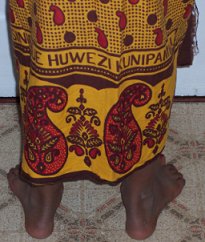Reading through a particular country's or tribe's proverbs, you can get a feel for various beliefs and attitudes. For example, when looking at proverbs from Uganda you get the feeling that leaders are often viewed with distrust. Given recent history, who could blame the Ugandans for distrusting their leadership?
Another theme found in the proverbs of the Igbo tribe of Nigeria is their obvious disdain for women. Their proverbs tend to view woman as not beign able to reason well, weak, and as sexual objects.
 It is not uncommon to find an African proverb to which several tribes lay claim to. Two such proverbs are:
It is not uncommon to find an African proverb to which several tribes lay claim to. Two such proverbs are:"From the word of an elder is derived a bone." Attributed to the Rwandan and Rundian Tribes
"Wisdom is like a baobab tree; no one individual can embrace it." Attributed to the Akan and Ewe Tribes
These tribes live relatively near to each other and one tribe probably heard it from the other and adopted it as their own.
In East Africa, pieces of fabric called "khangas" contain a proverb written in Swahili. The Swahili proverb in printed near the bottom hem of the khanga. East African women wear these khangas over their skirts, use them carry babies on their backs, as head wraps, along with other uses.
A couple African proverbs used in popular culture are "Love is blind" which is attributed to many tribes in Africa including the Mende tribe of Sierra Leone and the Kamba tribe of Kenya. Also, "It takes a village to raise a child" used as a book title by Hillary Clinton in the 1990s and is attributed to the Yoruba tribe of Nigeria.


